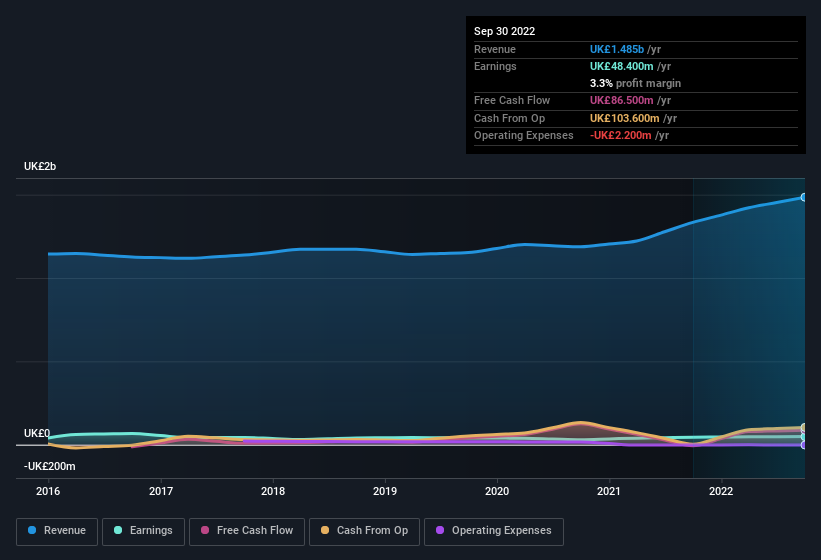
Wincanton plc's (LON:WIN) recent earnings report didn't offer any surprises, with the shares unchanged over the last week. Our analysis suggests that shareholders might be missing some positive underlying factors in the earnings report.
Our analysis indicates that WIN is potentially undervalued!

A Closer Look At Wincanton's Earnings
One key financial ratio used to measure how well a company converts its profit to free cash flow (FCF) is the accrual ratio. The accrual ratio subtracts the FCF from the profit for a given period, and divides the result by the average operating assets of the company over that time. The ratio shows us how much a company's profit exceeds its FCF.
Therefore, it's actually considered a good thing when a company has a negative accrual ratio, but a bad thing if its accrual ratio is positive. While having an accrual ratio above zero is of little concern, we do think it's worth noting when a company has a relatively high accrual ratio. To quote a 2014 paper by Lewellen and Resutek, "firms with higher accruals tend to be less profitable in the future".
For the year to September 2022, Wincanton had an accrual ratio of -0.73. That indicates that its free cash flow quite significantly exceeded its statutory profit. To wit, it produced free cash flow of UK£87m during the period, dwarfing its reported profit of UK£48.4m. Given that Wincanton had negative free cash flow in the prior corresponding period, the trailing twelve month resul of UK£87m would seem to be a step in the right direction.
That might leave you wondering what analysts are forecasting in terms of future profitability. Luckily, you can click here to see an interactive graph depicting future profitability, based on their estimates.
Our Take On Wincanton's Profit Performance
Happily for shareholders, Wincanton produced plenty of free cash flow to back up its statutory profit numbers. Based on this observation, we consider it possible that Wincanton's statutory profit actually understates its earnings potential! And on top of that, its earnings per share have grown at 19% per year over the last three years. Of course, we've only just scratched the surface when it comes to analysing its earnings; one could also consider margins, forecast growth, and return on investment, among other factors. So while earnings quality is important, it's equally important to consider the risks facing Wincanton at this point in time. Case in point: We've spotted 1 warning sign for Wincanton you should be aware of.
Today we've zoomed in on a single data point to better understand the nature of Wincanton's profit. But there are plenty of other ways to inform your opinion of a company. Some people consider a high return on equity to be a good sign of a quality business. While it might take a little research on your behalf, you may find this free collection of companies boasting high return on equity, or this list of stocks that insiders are buying to be useful.
Valuation is complex, but we're here to simplify it.
Discover if Wincanton might be undervalued or overvalued with our detailed analysis, featuring fair value estimates, potential risks, dividends, insider trades, and its financial condition.
Access Free AnalysisHave feedback on this article? Concerned about the content? Get in touch with us directly. Alternatively, email editorial-team (at) simplywallst.com.
This article by Simply Wall St is general in nature. We provide commentary based on historical data and analyst forecasts only using an unbiased methodology and our articles are not intended to be financial advice. It does not constitute a recommendation to buy or sell any stock, and does not take account of your objectives, or your financial situation. We aim to bring you long-term focused analysis driven by fundamental data. Note that our analysis may not factor in the latest price-sensitive company announcements or qualitative material. Simply Wall St has no position in any stocks mentioned.
About LSE:WIN
Wincanton
Wincanton plc, together with its subsidiaries, provides a range of outsourced and integrated supply chain solutions in the United Kingdom and Ireland.
Adequate balance sheet second-rate dividend payer.
Market Insights
Community Narratives



